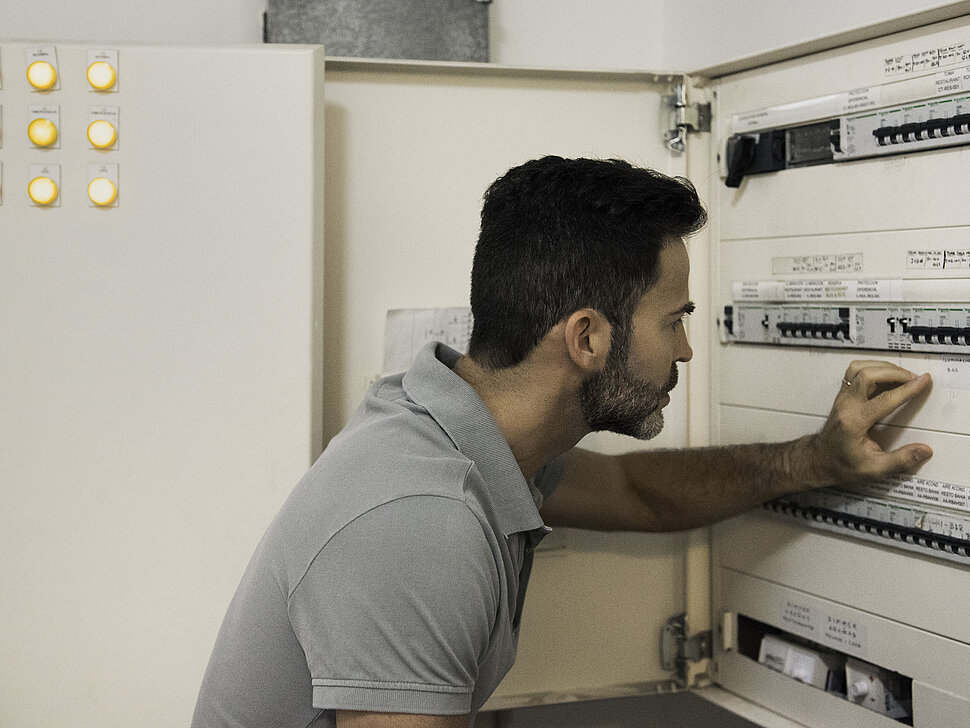Reading time: 8 min
How to Make House and Home Crisis-Proof
Whether you own your house or apartment or live in rented accommodation, you can always prepare for emergencies. Fire prevention, storm precautions, and flood safety are all things you can do something about to help you guard against harm.
It’s true that in the Ruhr area, we don’t need to worry about the storm surges found on the coast or the avalanches that occur in the Alps. But even here, the weather is unpredictable – from heavy rainfall to storms or flooding,or drought or the risk of fire when temperatures soar. Consequences can often include power outages or evacuation. Still, it’s perfectly possible to be well prepared for these.
Safeguarding your home against damage is just as important. Here, there are a few matters it is vital to consider. Read on for some tips to help you prepare and keep yourself and your home #readydoneright, from the roof to the basement.
How Can I Protect My Roof from Damage and Make It #readydoneright?
The roof of any house should be examined at regular intervals by an expert. Loose tiles must be replaced. Tiles that are particularly exposed to the weather can also be subsequently secured with screws or clamps to ensure that they will withstand a storm. There is an obligation to have what is known as wind uplift protection.
Guttering should be checked regularly for blockages caused by dirt or leaves. In the event of heavy rainfall, it is very important for the water to be able to be carried off properly and quickly.
Solar power equipment on the roof should generally be installed securely enough to make it stormproof.
The attic should be cleared out regularly and any items that will burn easily should be removed.
How Can I Protect My Basement from Damage and Make It #readydoneright?
In the event of flooding, occupants of houses need to anticipate that basement rooms may be inundated. To prevent a short circuit, the power should be switched off when there is a risk of flooding.
Equally, dangerous substances or chemicals should not be stored in the basement. Valuable items or documents should be stored in watertight containers.
The heating oil tank should be fastened securely to the wall or weighted.
Shafts, basement windows and basement doors should be sealed. In the event of flooding, these are the areas of weakness.
Install a backflow flap to avoid basement flooding causing a backflow from the sewer system.
Avoid the basement during storms. It can flood quickly, turning into a trap.
Guard against fire by regularly removing any materials that will burn easily from the basement.
How Can I Protect My Terrace and Balcony from Damage and Make It #readydoneright?
In the event of strong winds or storms, objects can be blown off terraces and balconies and cause damage – to your neighbor’s house, for example. It is therefore important to secure sunshades, garden chairs, and other furniture if a storm is forecast. Parasols and shade sails should be taken down and bicycles, garbage cans, and flowerpots should be put away or secured so as to make sure they cannot move during a storm.
It is also important to retract the awning. It could be torn off and blown away by a strong storm, potentially causing damage or injuring other people.
External plug sockets should be made safe or disconnected from the electricity grid.
How Can I Protect My Garden from Damage and Make It #readydoneright?
If you have trees, check them for dry branches or an unsound trunk. Should they have either of these, heavy rainfall or storms can cause branches to break off, causing injuries or damage.
Trees that are at risk of being blown down should be removed because the principle of force majeure – which means the owner will not be liable for any damage – only applies if the toppled tree was a healthy one.
You should think about a safe place to store garden furniture and other items in the event of a storm.
More Tips for Protecting Yourself and Your Home:
Prepare a folder containing all your important documents and store it in a secure location where it will be readily accessible. You will then have everything ready to hand in the event of being evacuated or having to leave the house because of a fire, so you can be sure of having all your important documents with you. To read more, click here.
In the event of a storm, close all windows and shutters.
Have a flashlight ready so as to have light available in the event of a power outage.
Install smoke alarms in every room apart from the bathroom and the kitchen. These may provide early warning in the event of a fire.
For insurance companies to accept damage, you must report it promptly. Ideally, you should document the situation with photographs.
What Kind of Home Insurance Cover Is Important to Be #readydoneright?
Even if precautions have been taken in your house or apartment, accidents or extreme situations are always possible. It is therefore advisable to take out insurance cover that will meet your costs in the event of damage. After all, most people don’t have the financial resources to access large sums of money at short notice. Please see below for a brief overview of essential insurance cover.
Residential building insurance is crucial for homeowners. It offers protection against costs incurred in rectifying property damage arising as a consequence of fire, lightning strikes (or power surges), explosion or implosion, storms (wind force 8 and above), hail, or mains water (caused by burst water pipes connected to appliances such as radiators or dishwashers).
Since other natural hazards are generally not included, it is also advisable to take out natural-hazard cover. Natural-hazard insurance can include both the building and property in the event of the following risk events:
Heavy rainfall, inundation, backflow
Flooding
Snow pressure, avalanches, landslides
Land subsidence
While residential building insurance and natural-hazard cover insure against damage to the house itself, homeowners or renters can also take out household contents insurance to cover all movable items such as furniture or electrical appliances in the event of damage caused, for example, by fire, lightning strikes, explosion/implosion, storms (wind force 8 and above), hail, mains water, or power surges.
Essential for Renters and Owners Alike: Liability Insurance
Everyone should have liability insurance – be it a private policy if you live in rented accommodation or liability insurance for homeowners and landowners if you rent out or own properties and/or land. Liability for landowners applies, for example, if passersby are injured – because of a loose flagstone, for instance, or icicles falling from the roof. Here’s some handy information: if you own a building and live in it, private liability insurance is sufficient.



